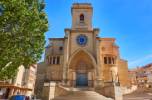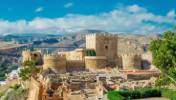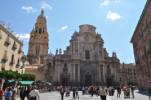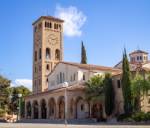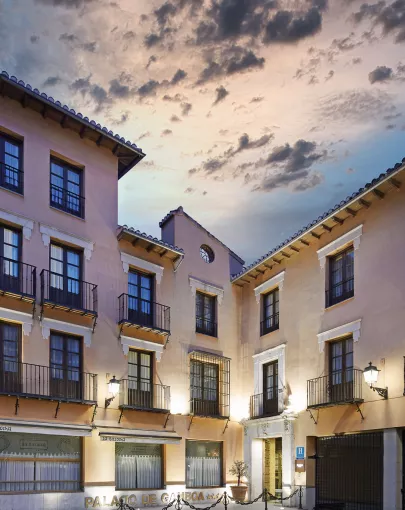The Alhambra is a monumental complex located in the city of Granada, in the autonomous community of Andalusia, in southern Spain. This architectural gem, dating back to the Middle Ages, is considered one of the most popular and visited tourist destinations in the country. Declared a UNESCO World Heritage site, the Alhambra has witnessed a rich and fascinating history, spanning several centuries of Muslim influence in the region. For centuries, it was the residence of the Nasrid sultans and a center of political and cultural power. The complex, which includes palaces, gardens, fortresses, and courtyards, perfectly blends Islamic architecture with Christian and Renaissance influences, making it a unique place in the world. Its most emblematic monuments, such as the Palace of the Lions, the Alcazaba, and the Generalife Gardens, continue to attract thousands of visitors each year, who are in awe of its beauty and atmosphere of calm and serenity. Aside from its impressive architecture, the Alhambra is also a testament to the history of coexistence between different cultures on the Iberian Peninsula. Every corner of this monument tells a story, from its delicate ornamental details to its great walls that have withstood the test of time. If you want to enjoy a unique experience while visiting this historical treasure, staying near the Alhambra is the ideal option. With hotels located nearby, you can easily explore this magnificent site and immerse yourself in the rich cultural and historical heritage that Granada has to offer.
Hotels near the Alhambra
More about Hotels near the AlhambraHotels found: 2
Sercotel Granada Suites
Your home in Granada is called Sercotel Granada Suites. It may sound like a cliché, but once you walk through the door of your apartment you’ll realise it’s true. Natural light, painstaking décor and the warmth of a combination of white and wood. Knowing that the accommodation you’re going to spend the next few days in has been cared for down to the tiniest detail. Don’t you believe us? The four-star apartments at the Granada Suites Hotel are modern and functional and designed to make your life easier on any kind of trip.
Their spaciousness and capacity make them the ideal choice if you come with family or friends. Up to four people will be able to sleep in the same apartment as there’s a double bed and a sofa bed. The tastefully decorated and private rooms are also the ideal accommodation for a couple seeking a getaway. They’re perfect if you’re travelling on business due to their excellent location. Not only is the Sercotel Granada Suites located in the city centre, it’s also close to the main access roads. Visiting the old town is always tempting, but if you have to leave it behind for a while, the hotel’s excellent transport links will make it easy to go on trips. As far as the Sierra Nevada. About 45 minutes will separate you from a day in the snow in winter. What are you into, skiing or snowboarding?
We all know that Granada is a city that can be explored on foot. So, on your return, park your car in our private parking facilities located in the same building as the Sercotel Granada Suites. Walk up to your flat from them and make yourself comfortable. Connect to the Wi-Fi to view the recipe you love so much and prepare it in the kitchen in your apartment. It’s fully equipped, with a ceramic hob, a fridge, a dishwasher and so on. You’ll realise that you have everything you need to isolate yourself from the world, if that’s what you feel like. But if you prefer to go for a stroll, that’s fine too.
In the summer months we advise you to take a dip in our swimming pool as soon as you get back. And just one more thing, the roof. You can imagine the views. The city’s rooftops will unfold before you, the Alhambra will look wonderful in the distance and the Cathedral will seem so close that you can reach out and touch it. When you’re able to stop admiring the spectacle of Granada stretching out before your eyes, relax on one of our sun loungers, feel the heat dry your skin and pass the time until the sun’s rays lose their strength. Then it’s time for you to go out and enjoy the city.
We weren’t lying when we told you that the Sercotel Granada Suites is located right in the city centre. So much so that it will only take you ten minutes to get to the Cathedral and the famous Elvira Street. You’ll be able to try the delicious tapas served in its bars. A little further on, the Albaicín awaits you with its steep and cobbled slopes and the well-known San Nicolás viewpoint. It’s said that you can see one of the finest sunsets in Spain from here, with the sun tingeing the Alhambra with orange shades.
Don’t settle for enjoying it from afar. Come and explore its interior, marvel at its history and fall in love with the beauty of its architecture. We can’t think of a better way of ending a trip to Granada. Well, only by going back to our Granada Suites Hotel and winding down. Sink into one of our beds and recharge your batteries.
Transfer (check price)
Sercotel Palacio De Los Gamboa
Congratulations. You have just set foot in one of the most charismatic and beautiful cities in Spain. Once again, congratulations, because if you have arrived at the door of our Sercotel Palacio de los Gamboa to check in, you have made a great decision. Our hotel is located in a two-storey former palace and its 69 rooms are distributed around two beautiful courtyards. And all of this in the heart of Granada. Do you want to know more? The Palacio de los Gamboa hotel is located in the city's business district and a stone's throw from the Town Hall. If the purpose of your trip is work-related, we have everything you need for you to be able to work in complete comfort.
However, being in Granada and not enjoying yourself is not an option. The cathedral’s bell tower is one of the must-sees in the city. Did you know that you don't have to worry about booking? Call our reception and the team will arrange your private visit to the great Andalusian complex. Fact: we are just a leisurely half-hour walk from this monument. The location of the Sercotel Palacio de los Gamboa is an absolute privilege. All around us, the Cathedral, the Albaicín and the Monastery of San Jerónimo. As we said: you are at the epicentre of Granada's action. And that's if we're talking about the outside. Inside, be sure to take a look at our beautiful façade, stroll along those corral-like balconies and look up at the sky from both courtyards... see that? It is a beautiful window. You are in a special place that reflects the elegance of other eras.
Warning: you may get a Stendhal rush when you enter your room. This is what happens if you are lucky enough to come across those beds with headboards that are a work of a master cabinetmaker. By the way, you can choose your pillow à la carte, because the aim here is to give you a good night's rest. And in the morning? What you smell as you approach the dining room is pure joy: a breakfast buffet full of goodies and so aesthetically perfect that you'll be embarrassed to grab that piece of fruit or get that ham and tomato for a nice slice of sourdough toast. It is the garden of delights.
If you want to continue enjoying the pleasure of gastronomy, book a table in the hotel's restaurant, where a menu full of traditional products summarises the essence of Granada's cuisine. Would you like more reasons to stay at our Sercotel Palacio de los Gamboa Hotel? Note: private garage... and a unique atmosphere to enjoy Granada squared.
Breakfast buffet
Early check in
Late check-out available
Sercotel Services
Hotels near the Alhambra
Accommodation near Granada's treasure
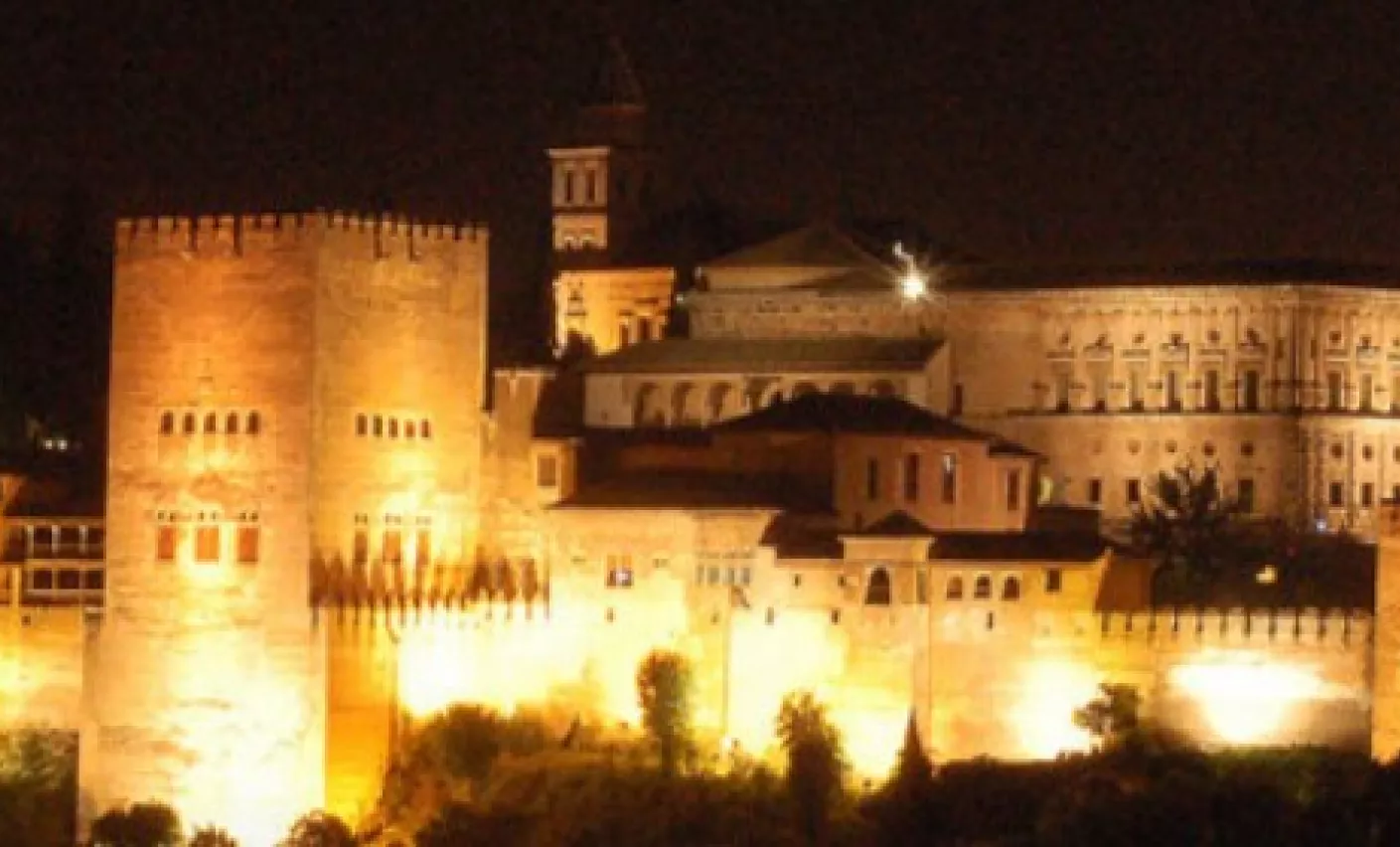
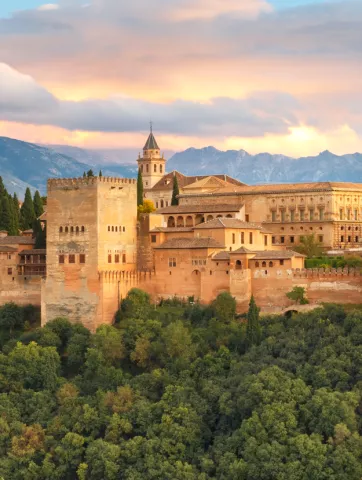
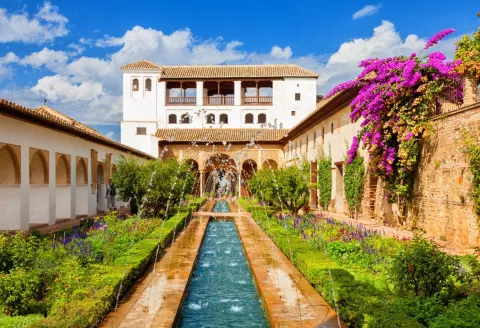
The Alhambra is a complex that includes palaces, fortresses, and gardens, dating mainly from the Islamic period of Spain, specifically the Nasrid period, spanning from the 13th to the 15th centuries. Construction began in the 13th century under the rule of the first Nasrid king, Muhammad I of Granada, and continued over the following centuries with contributions from other Nasrid monarchs.
The palaces of the Alhambra are known for their impressive Islamic architecture, featuring intricate details in plaster, ceramic tiles, and beautiful interior gardens. Among the main palaces are the Palace of Comares, the Palace of the Lions, and the Palace of the Myrtles. In addition to the palaces, the Alhambra also includes the Alcazaba, an ancient military fortress; the Generalife, a palace and gardens located outside the walls; and the Palace of Charles V, built in Renaissance style.
Hotels near the Alhambra are usually located in areas with a wide gastronomic offer, allowing you to enjoy local cuisine and other types of restaurants near where you stay. Being close to the Alhambra immerses you in Granada's historical and cultural atmosphere. You can enjoy the unique atmosphere of the area and explore other nearby points of interest, such as the Albaicín neighborhood.
The history of the Alhambra reflects the complex interaction between Muslim, Christian, and Renaissance cultures on the Iberian Peninsula, and its legacy remains an integral part of Spain's cultural identity.

Sercotel Rewards is our loyalty programme that will enable you to enjoy exclusive benefits and offers. Sign up and get a discount of up to 15% on your next booking.
Will you join the club?



